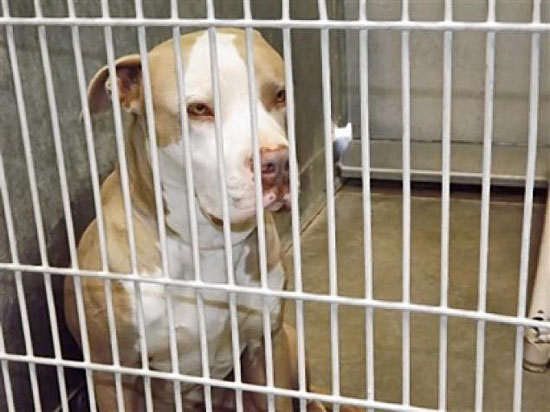Pit bull attack unleashes a crackdown
June 25, 2013

The county hopes new measures will reduce maulings, such as one that led to the death of an Antelope Valley woman. The owner of this dog, and others, has been charged with murder. Photo/AP
Even before a 63-year-old woman was mauled to death in May in the Antelope Valley, Los Angeles County animal control officers were increasingly concerned about dangerous dogs.
Some 10,000 calls last year—about one in ten—involved biting or aggressive canines. Packs of abandoned dogs in the high desert had become an ongoing issue for livestock owners.
“We had three really bad attacks against our officers in the past year,” says Department of Animal Care and Control Director Marcia Mayeda. “In one, a sheriff had to shoot a pit bull off our officer.”
So on Monday, as part of its 2013-14 budget, the Board of Supervisors addressed the problem by approving $3.5 million in new spending on animal control. Among the priorities: nineteen new animal control officers and supervisors, extra support for vicious dog investigations and prosecutions, a half-dozen new animal control trucks, more protective equipment and an additional call center in Lancaster to more quickly field complaints and deploy help in remote areas.
“This is going to be a big improvement in public safety,” says Mayeda. “Every one of these changes is going to make a difference.”
The appropriations come in the wake of the May 9 death of Pamela Devitt, a retired office manager who was mauled to death by a pack of pit bulls during a morning walk in her neighborhood in unincorporated Littlerock. The dogs’ 29-year-old owner, Alex D. Jackson, has been charged with murder. Prosecutors say he had been growing marijuana in his home, apparently using the animals as guard dogs, and that authorities had received at least two other complaints about them in the past six months.
About $1.5 million of the new money will build and staff a new call center in the Antelope Valley, where dog packs have become a chronic problem, says Mayeda.
“A lot of people abandon animals in the desert, and they form packs and cause harm,” she says. After the Littlerock mauling, Devitt’s neighbors told reporters that they carried guns in case of dog attacks, and brought their pets inside at nighttime.
The new call center, which will be set up in a modular unit on the grounds of the department’s Lancaster office, will be staffed with a half-dozen clerks, a supervisor and two animal control officers. Among other things, Mayeda says, it will help ensure that officers in the high desert get sent to the right addresses. It also will shorten wait times for callers throughout the county, who now get routed to the department’s understaffed hotline in Downey, where it’s not unusual for them to spend up to 20 minutes on hold.
Also in the budget will be a specialized 9-person countywide unit devoted to investigating and preparing the often labor-intensive petitions required to designate a dog as “potentially dangerous.”
Three more animal control officers will buttress the department’s Major Case Unit in Lancaster, working with the District Attorney to prosecute cases, and five more field officers will be dispatched to animal control offices throughout the county.
“If we’d had more Major Case Unit officers, the guy in Littlerock might have come up on our radar sooner and we might have been able to bring a case against him sooner,” says Mayeda.
In addition, she says, an expansion of the county ordinance that defines a “potentially dangerous dog” could help avert future tragedies. Currently, a dog is labeled “potentially dangerous” if it has killed, bitten or injured a person without provocation, or if it leaves its owner’s property and kills or injures another person’s cat or dog. A proposed amendment, now in the works, would expand the definition to include attacks on livestock, a particular problem in rural parts of the county, empowering animal control officers to take a larger number of dangerous dogs off the street.
Mayeda says she’s encouraged by all the new efforts aimed at cracking down on animals—and owners—who are jeopardizing the public safety and security. “This is a big step toward getting us where we need to be.”
Posted 6/25/13












 405 bridge work causes a stink
405 bridge work causes a stink
